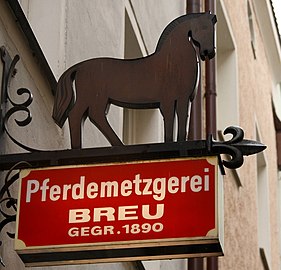Horse butchery
The Pferdemetzgerei , Horse Butcher , Horse butcher , Ross butcher or horse slaughterhouse in Austria Pferdefleischhauerei called, is a special butcher , the only horse meat and sometimes donkey meat is offered.
Activities of the horse butcher
The horse butcher deals with the production or processing of meat and sausage products from horse and donkey meat for consumption. He works in a butcher's shop or in a slaughterhouse . The profession has changed a lot in recent years. The horse butcher hardly slaughters anymore, but, like in the rest of the butcher's shop, mainly deals with the processing and refinement of the meat.
Slaughter
Many horse butcheries either slaughter themselves or obtain their goods from slaughterhouses in the immediate vicinity, so that long animal transports are no longer necessary. Some horse slaughterhouses work together with animal welfare organizations insofar as they can be checked by them according to horse protection criteria. Even emergency slaughter be performed.
Horse meat
In addition to the typical dishes in Germany, the Rheinische Sauerbraten , which was at least originally made with horse meat, and the roasted Rosswurst at markets .
distribution
There are horse butcheries in Europe mainly in Germany, Austria , Switzerland , Belgium , France and Italy .
Italy
In Italy, several dishes are traditionally made from horse or donkey meat. In Piedmont , this includes tapulone , a minced donkey braised in wine , which is served with horse polenta and roast beef . Likewise, the sausages called salumi were originally made from donkey meat.
Switzerland
In Switzerland itself, however, comparatively little horse meat is produced: 411 tons (2011). Around 5000 tonnes are imported annually, mostly from America (Canada, Mexico and Argentina).
Legal
Since 1993 it has been permitted in Germany to sell horse meat products together with other meat products.
criticism
The Tierschutzbund Zürich (TSB), in collaboration with other animal welfare organizations, has taken a critical look at horse meat imports into Switzerland. The organizations refer to film recordings from the USA , Canada , Argentina and Mexico that show how horses are beaten with sticks and bitten by dogs while being loaded, how sick animals suffer and die if left untreated, how horses last longer than a day without water, food or rest transported to the slaughterhouse and improperly anaesthetized there. The Tierschutzbund Zürich accuses Swiss importers and dealers of violating their own animal welfare promises: It is alleged that horses in the countries mentioned are treated according to Swiss or EU animal welfare standards, but in many cases this is not the case. The non-European slaughterhouses had EU approval that was also accepted in Switzerland, but recordings from two Canadian slaughterhouses would prove that horses were not properly stunned before slaughter.
- Horse butcheries
See also
- Vienna Central Horse Slaughterhouse , in the 19th century in Vienna
- Old slaughterhouse Aachen with horse slaughterhouse
- Municipal cattle and slaughterhouse in Dresden with horse slaughterhouse
literature
- Agnes Ulrike Gudehus: The development of horse slaughter and horse meat consumption in Germany taking into account the legal changes. Dissertation, Veterinary Faculty of the Ludwig Maximilians University Munich, 2006, digitized version (PDF; 4.5 MB) on the website of the University of Munich.
Web links
Individual evidence
- ↑ Slow Food Editor : Osterie d 'Italia 2012/2013. HALLWAG Gastronomic Travel Guide. Graefe and Unzer, 2012. Page 39. ISBN 978-3-8338-2635-1
- ↑ a b c d Retailers remove imported horse meat . I NZZ



